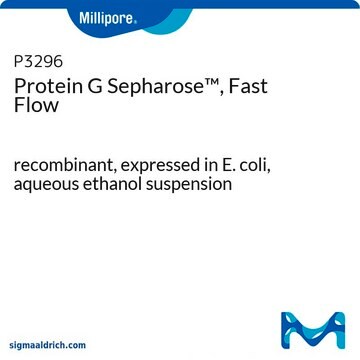P4691
Protein G-Agarose, Fast Flow from Streptococcus sp.
saline suspension
About This Item
Recommended Products
form
saline suspension
extent of labeling
≥2 mg per mL
matrix
Highly cross-linked 4% beaded agarose, fast flow
matrix activation
cyanogen bromide
matrix attachment
amino
matrix spacer
1 atom
capacity
≥20 mg/mL binding capacity (human IgG (I 4506))(in 20 mM sodium phosphate, pH 7.0)
storage temp.
2-8°C
Looking for similar products? Visit Product Comparison Guide
Application
Physical form
Preparation Note
Storage Class Code
3 - Flammable liquids
WGK
WGK 1
Flash Point(F)
Not applicable
Flash Point(C)
Not applicable
Certificates of Analysis (COA)
Search for Certificates of Analysis (COA) by entering the products Lot/Batch Number. Lot and Batch Numbers can be found on a product’s label following the words ‘Lot’ or ‘Batch’.
Already Own This Product?
Find documentation for the products that you have recently purchased in the Document Library.
Customers Also Viewed
Our team of scientists has experience in all areas of research including Life Science, Material Science, Chemical Synthesis, Chromatography, Analytical and many others.
Contact Technical Service






